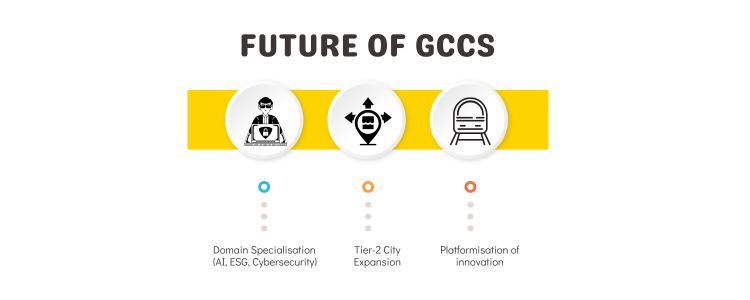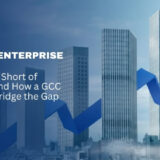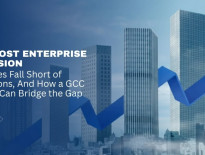
In the developed landscape of the global capability centers (GCC), the medium-sized centre has emerged as a strategically suitable place, a combination of motion, depth and scale in methods that attract talents and speed up innovation. India now has around 1,900 GCCs, and the region earned a revenue of about 64–65 billion US dollars in 2025, while employing about 1.9 million professionals – a trajectory that prepares the basis for rapid expansion of medium-market centers. Medium-sized GCCs (usually 500–2,000 employees) offer solid economic benefits: low installation and operational costs compared to larger centers, fast time-to-time for capacity launch, and focused domain expertise that generates high revenue per employee. According to research, India’s GCC market will reach three-digit billions by 2030, with adequate employment in high-value roles and a comprehensive profit that is in a position to exploit the mid-sized GCC.
Medium-sized GCCs avoid the bureaucracy of large centres and also maintain enough resources to invest in AI, cloud and data platforms. This balance enables fast piloting, dense feedback loops and quick rollouts of global products and features. Recent appointment trends suggest that medium-sized GCCs are beyond their large competitors, increasing the number of employees at the rate of double digits, which is a direct reflection of the demand for tight capacity building in AI and analytics.
Top talent seeks impact and clear career acceleration. Early ownership of medium-sized GCC projects provides cross-functional experience and leadership paths that are difficult to repeat in huge organisations. They can make competitive pricing, provide targeted L&D and provide global experience, factors that reduce the number of employees and attract experts from machine learning, cloud engineering and domain analytics.
Medium-sized GCC innovations serve as sandboxes: focused teams, domain uniqueness (for example, AI in BFSI or analytics in manufacturing), and direct sponsors to global business units. They convert prototypes into production with low obstructions and become the primary engine of enterprise-level digital changes. It will result in a high ROI on per capita innovation flow and research and development expenditure.
With growing activities in mature ecosystems and tier-2 cities in Bengaluru, Hyderabad and Pune, form a deep partnership with medium-sized GCC startups, research laboratories and universities. These relationships intensify access to specific talents and communicate efficient employment in local economies, an economic multiplier that strengthens both recruitment and innovation pipelines.
Medium-sized GCCs will work faster as primary innovation engines for multinational companies. Expect three clear projection paths:
Medium-sized global capability centers are not transitional cost centers; They are long-term strategic assets. By combining the culture of economic efficiency, talent attraction and rapid use, they are winning both talent and innovation. For corporations that are designing the future of the GCC, this suggestion is clear:Invest in medium -market centers as your scalable innovation partners – they provide measuring economic benefits and strategic options for the future today.
In Industus GCC, we strengthen enterprises to design, scale and adapt our global capability centers with a future-designed approach. From strategic advice to pursuing talents rapidly and enabling innovation, we create GCCs that provide agility, cost-skills and competitive benefits. Whether you are establishing your first GCC in India or changing a medium -sized center into a global innovation engine, our expertise ensures sustainable development.
A GDC refers to a single-minded offshore deployment, which provides proficient business, technology and operational services to corporate bodies on a global basis. BFSI, IT services, healthcare, telecom, retail, manufacturing, and other upcoming technologies, including AI and blockchain. They do not only target cost savings but now aim at innovation, automation, R&D, digital transformation, and high-value consulting. They design and create cloud, artificial intelligence, analytics, cloud security, and process automation. A large supply of STEM graduates, multilingual workers and niche skills in AI, ML, cloud, and analytics. Aditi, with a strong background in forensic science and biotechnology, brings an innovative scientific perspective to her work. Her expertise spans research, analytics, and strategic advisory in consulting and GCC environments. She has published numerous research papers and articles. A versatile writer in both technical and creative domains, Aditi excels at translating complex subjects into compelling insights. Which she aligns seamlessly with consulting, advisory domain, and GCC operations. Her ability to bridge science, business, and storytelling positions her as a strategic thinker who can drive data-informed decision-making.
Agility That Overtakes The Scale
Talent Attraction: Development, Ownership and Career Velocity
Innovation in the GCC
Cooperation Ecosystem and Local Economic Impact
Mid-Sized GCCs vs Large & Small Peers
Factor
Large GCCs
Small GCCs
Mid-Sized GCCs (Winning Edge)
Agility
Low (bureaucracy)
High but resource-constrained
Balanced — fast decisions + sufficient resources
Talent growth
Slow promotion cycles
High exposure, limited roles
Rapid career paths and leadership roles
Innovation
Large budgets, slower experiments
Quick pilots, limited scale
Focused experimentation → scalable products
Economic impact
High absolute spend
Localised impact
High per-employee value + regional multiplier
The Future of GCC

Conclusion
frequently asked questions (FAQs)

Aditi
Hey, like this? Why not share it with a buddy?
Related Posts
Recent Blog / Post
- Pharma GCC Setup Services in India: Strategic Considerations for CXOs January 9, 2026
- Why Enterprises Are Rethinking Their GCC Strategies in 2026 January 8, 2026
- Why Most Enterprise Expansion Strategies Fall Short of Projections, And How a GCC Enabler Can Bridge the Gap January 7, 2026
- India’s GCC Ecosystem: Why the World’s Biggest Companies Are Betting Their Future on it January 3, 2026
- Healthcare GCCs in India: Where the World’s Pharmaceutical Innovation Actually Happens January 2, 2026
- Circular Economy Models and Their Relevance to Manufacturing GCCs December 30, 2025
- GCCs in Agritech: Digitizing Global Food Security December 29, 2025
- Renewable Energy GCCs: Accelerating Global Green-Tech Development December 29, 2025
- Cyber Resilience 2030: Multi-Layer Security Architecture for GCCs December 26, 2025
- Building an Integrated Risk Management Framework for Multi-Region GCCs December 26, 2025
- The Ethics of Automation: How GCCs Maintain Human Oversight in AI Workflows December 25, 2025
- Future of HR in GCCs: Data-Led, Skills-Based, and GenAI-Driven December 25, 2025
- The Proposal to Standardize India’s GCCs for Unshakeable Global Leadership December 24, 2025
- Global Capability Centers: A Strategic Growth Model for B2B Enterprises December 24, 2025
- AI Ethics & Compliance Mandates for GCC Operations in 2025 December 23, 2025
















